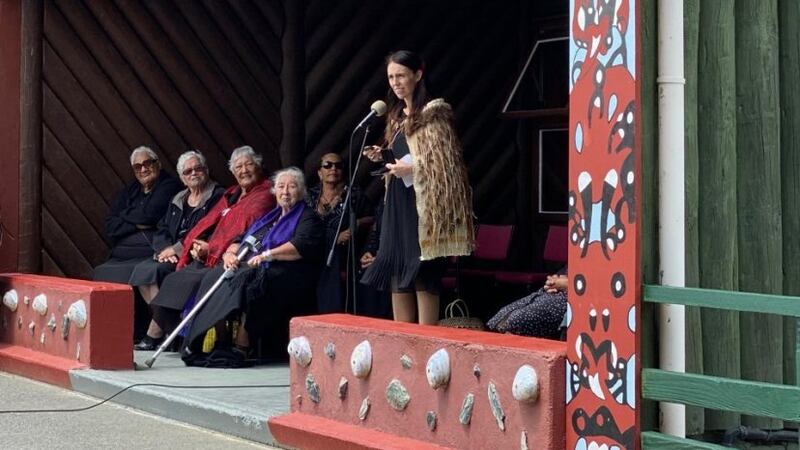Prime Minister Jacinda Ardern has delivered a speech honouring the kaumoana of Tuia 250 for the impact they have made in Aotearoa during their 10-week voyage.
Ardern and other dignitaries including Minister Kelvin Davis and British High Comissioner Laura Clarke were welcomed onto Tuahuru Marae for the Tuia 250 closing ceremony.
During her speech, Ardern said around 400 kaumoana were involved in the voyage and they received a record of 40,000 visitors who had the opportunity to learn more about New Zealand's history.
Tuia 250 has unleashed an unstoppable desire to keep moving forward and continue the kōrero about who New Zealanders are, say the co-chairs of the Tuia 250 National Coordinating Committee, Dame Jenny Shipley and Hoturoa Barclay-Kerr.
Today Dame Shipley and Barclay-Kerr were part of the closing ceremony for the Tuia 250 Voyage, held at Tuahuru Marae in Te Māhia today.
For Barclay-Kerr, one of the most significant outcomes of the Tuia 250 Voyage is that it has helped foster a deeper and wider understanding of the voyaging histories and capabilities of tāngata whenua.
“Over the last ten weeks, people have seen waka and tall ships sailing together, and they’ve learned about the journeys made across the Pacific, well before James Cook came to these shores.”
“I hope we have helped lay to rest once and for all the notion that James Cook ‘discovered’ Aotearoa. When he arrived here on the Endeavour in 1769, he encountered a people who had discovered and settled this land many, many centuries beforehand, using sophisticated navigational and voyaging skills.
Barclay-Kerr says the voyage has also helped bring to the forefront the names of tāngata whenua often missing from stories told about the first encounters between Māori and Pākehā.
“Through Tuia, New Zealanders have been hearing and talking about people such as Te Maro and Koukou, in the same historical vein as Cook and Banks. This rebalancing of our history is an important step forward, because through increased knowledge comes increased understanding.”
Add to...
[ Log in ]
to add this video to a playlist.
Dame Jenny says, “This Voyage has had an undeniable impact on the communities visited, and on New Zealanders far and wide who joined in the conversations and opened themselves to looking at our history in a new light.
“Over the past 10 weeks, many of us have gained a new level of insight into the settlement of this nation, as stories are well known by local iwi finally received the wider hearing they deserved, and the Endeavour’s stories have been considered in a broader context."
The Tuia 250 Voyage has involved a flotilla of vessels representing Māori, Pacific and European voyaging traditions sailing to sites of significance around Aotearoa since early October.
“This rebalancing of our history, which has reset Kiwis’ understanding of who we are and where we come from, has marked an important step forward for us all as New Zealanders. The conversations Tuia has provoked haven’t always been easy, and for many there is still a lot of pain associated with our past. However, what we’ve witnessed is that when that pain is acknowledged, healing can begin, Dame Shipley says.
“We’re confident that if we continue the spirit of openness and understanding that has been a hallmark of Tuia 250 so far, we can contribute significantly to relations between Māori and Pākehā in this country as we look to the future.”
Both co-chairs believe it’s important that we keep the Tuia spirit alive and actively continue the consideration, the korero and the commitment to action that Tuia 250 has ignited, so it has a legacy that will carry beyond the next 250 years into the future.
“In celebrating and acknowledging our dual heritage, confronting the encounters that define us and weaving our cultures together, precious and different as Tuia implies, we can build the shared future we are striving for,” Dame Shipley and Barclay-Kerr concludes.

